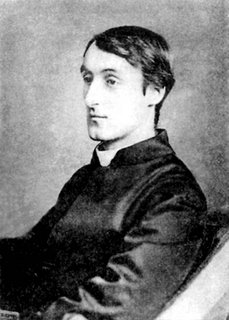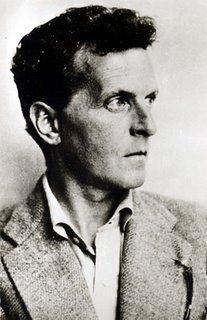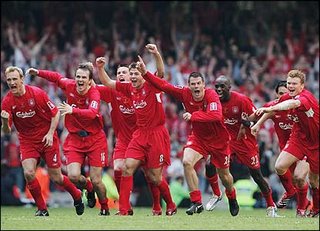Well, I had an interesting long dialogue with Ashish on Gtalk today. It encompassed art, fiction, technology, the future of reading and other equally interesting topics. I transcribe it below.
John: hi ashish...did you see my blog?
Ashish: no
what's the link?
welcome to blogland
John: it's on the shakespeare and co page--at the bottom
thanks
Ashish: going there
John: ok thanks..it looks the same as the rest
Ashish: yeah they do have a couple of the same templates
but some people change the look on their own
like what pragya did with the shakespeare adn company blog
but some html is required
however, the basic templates available are fine methinks
John: is she a programmer?
Ashish: no
she asked someone else to do it
John: rajendra?
Ashish: i like this stuff you wrote - i am a man, one of the billions that walk the earth
i think it was rajendra
John: haha..yes
couldn't think of anything profound
Ashish: it''s hard to answer those bits
John: yes it is
Ashish: well you can always change it later on
you can even add links
and site statistics to
blogger.comJohn: well...i take it to be a spontaneous thing and not too thlought over
interesting
Ashish: that's ok... once you get in the flow of things
you'll find other people reading it as well
and then others
John: thought for the day kind of a thing
Ashish: or even comments
on life or whatever
John: yes
Ashish: if you focus on one particular thing, then, it makes your blog quite focused
and attract readers
John: is that what you do?
Ashish: kind of...
i started my blog with some essays and comments
and sometimes i would post short stories and poems
and pictures
John: about injustice?
Ashish: but now i am more or less going to write articles and commentaries
from an expat point of view
John: good...for me i think it will just be a few sentences each day
about something
Ashish: that should help
but i think one should just write and then it starts
John: thought for the day kind of a thing
Ashish: one must make it a little bit provocative because that certainly grabs more readership
provocative or anything that challenges something
John: ahh yes
Ashish: it usually gets more response and attracts readership
besides you can always use your blog as a way to promote your website, your books and yourself as a writer
John: i think i am naturally provocative in what i write
Ashish: i read a news-report the other day that said bloggers have a better chance of getting jobs as writers
John: yes but it gets to be a pointless circle...each is promoting the other but not much
Ashish: because prospective employers/ editors can read what they write
and since there is a discipline involved in posting regularly... that is also taken note of
John: well maybe
but a good page is important too
Ashish: plus if a blog is geared towards a specialised topic, then, that helps enhance a writer's prestige as well
yes that's important, too
John: several interviews i had asked me if i could show examples of my page building skills
Ashish: but again... it's all about good writing
John: so i gave the englit page and my home page
Ashish: and now you can show your blog as well
John: yes
you know i'm not sure it is all about good writing
Ashish: well some of the really good blogs are
John: or at least not in the short term
Ashish: some of the good and popular blogs are all about style and substance
John: journalistic?
Ashish: some bloggers are read because they write well
some journalists blog because they can write stuff they cant
John: well..i don't reads any blogs just because they write well
Ashish: well it usually helps
i have noticed there is a particular style involved in blogging...
John: perhaps for information
Ashish: information as well as commentary
or even reviews
John: especially if i can't get it elsewhere
Ashish: during the tsunami
John: yes
Ashish: some bloggers came together to develop a 'rescue and aid' focused blog
that became very famous
John: that's very good
Ashish: and was even used and referred to by news organisations
and they were even rewarded
now they have used that experience to form a blog that's geared towards responding to any worldwide emergency
they did one for katrina as well
John: actually writing is a fairly minor activity, mostly in the pocket of big corporations
the nobel prize is a laugh financed by a gunpowder magnate
Ashish: that's true
nobel peace prize is quite an irony
John: yes indeed
just another form of patronage
Ashish: yup
John: the best age of writing is probably in the past
the internet is leading us in new directions
and making people less and less interested in the printed word
Ashish: i think the internet has the potential of shaking the corporates' hold on writing
John: they want interactivity all the time
it's amazing how many people see any kind of reading as a chore
Ashish: i dont feel too attached to the printed word because i feel it's a matter of technology
and it changes
interactivity poses tougher challenges, methinks
as far as writing is concerned
keeps the writer on his toes
John: with ythe stories i write i often get people saying "i really enjoyed that" if they are forced to read for some reason...but they would not read for fun in their own time
Ashish: true
John: they want the printed word turned into pictures
100 years ago it was very different
Ashish: well, as long as people read
John: 50 years ago it was different
yes..but read what?
Ashish: TV is a bigger threat to reading than the Internet
because TV is passive
John: all of it..the new technology taken together
Ashish: whereas Internet promotes reading ... whatever it is
John: not sure about that
Ashish: you can read poetry, plays... even shakespeare
John: it might promote reading in sound bytes
but not real traditional solid reading
Ashish: yes
John: we are in a minority that is shrinking smaller all the time
Ashish: well in that case we must try and ensure solid reading takes place on the Internet... at least
John: yes...but we are preaching to the converted
Ashish: because, i think, the converted need to harness the Internet's potential, too
John: even there...i put up poems now because i know that real long stories will mostly be ignored
ok if it's sound byte length
a few paragraphs
Ashish: was thinking about the topic the otehr day
and realised the way people use Internet has changed in the past few years
from emailing to chats..
we are now looking at networking
John: i put up what i thought was a really good thriller about a month ago
Ashish: which, again, is an evolution from the chatting
John: and it got zero responses
Ashish: that's sad
sorry i think i must have ignored it, too
what was the title...
John: then i put up a really long short story--and the responses made it clear that the writers hadn't even read the story
now i don't bother
Ashish: i could check it now since i am not as tied up as I was before
but yes i agree... tv has reduced the attention span
John: well that would be nice..but don't feel compelled...in your own time
Ashish: mother should be discharged in a day or two
John: but the point is i am trying to entertain people
and mostly they don't even want to start reading!
that's a real problem
Ashish: yes, true
John: i don't know the answer
turn them all into film scripts
Ashish: people in search of soundbytes
John: yes
Ashish: but film scripts require a much more disciplined form of writing
John: well i wouldn't say it was more disciplined...just different
otherise we'll have to say that the lowest script writer was more disciplined than dickens
Ashish: no i didnt mean that
but a good film scriptwriter needs to be in control of so many elements
even the silence has to be scripted
John: oh yes
Ashish: even the silence has to be meaningful
John: it's a different skill
Ashish: the best script is the one where the actors use minimum words
John: reading abook is all silence
Ashish: and the worst script is the one where the actors speak non-stop
John: not dickens or shakespeare then
Ashish: even describing the very act that they are doing
John: who are both wordy
Ashish: i think shakespeare makes good cinema
John: well..he's wordy
Ashish: mainly because he doesnt spend too much time describing the ambinece
ambience
but the characters speak
and one can use silence very effectively in shakespeare
and even the way the scenes change...
almost made for film
John: perhaps fiction is dying
Ashish: true
unless that fiction has a film contract attached to it
John: yes
Ashish: like john grisham
John: if fiction dies i guess university fiction courses will follow
Ashish: unless technology introduces a very portable e-book concept
where one can download entire texts
John: like the radio
50 years ago everyone had a radio
Ashish: because until that happens, we'll find books on a deathbed
John: now almost no one
Ashish: yes... but radio reinvented itself
and FM entered the car
and now satellite radio has made a headway
John: well i don't mind reading e books now
Ashish: plus internet radio has also changed its contours
John: but i seem to be in the minority
Ashish: same here...
John: well..these are interesting tributaries of the internet
Ashish: maybe the coming generation will find it easy to use e-books
text books could be downloaded on e-books
John: but maybe people listen to internet radio for 30 mins a day
Ashish: would reduce kids from turning into hunchbacks
John: they used tob listen to radio 24 from 24
Ashish: oh i listen to internet radio almost 8 to 10 hours
i stopped listening to radio bahrain long time ago
John: well that's unusual i'd think
Ashish: when we were kids, radio bahrain was the universe
John: i don't listen to it at all
i am sure that within 100 years paper and print will disappear
maybe less
Ashish: maybe we will all have individual tablets or laptops
John: it's very expensive felling all those trees
Ashish: i agree
John: and making paper
Ashish: and with broadband becoming widely available
John: now you even sign your name electronically when fedex delivers
Ashish: yes
John: all this will develop apace
don't know where it's all leading though
maybe a wider and more varied education
Ashish: might happen soon but it all depends on how economical the devices are
the technology is already here
John: but less emphasis on reading long books
Ashish: but it's the economics
John: and on the concentration needed for that
Ashish: i mean if i can get all of john grisham's books in one e-book device... would love that
John: well that's what i do now
i have been reading a little known historical romance of arthur conan doyle on my computer
Ashish: or if i can have my entire library available to me at a single click... much easier and enjoyable than having to sneeze after picking up an old book from a dusty shelf
John: i've nearly finished
Ashish: neat
John: yes
obviously the only thing lacking is a really satisfactory ebook reading format...but that is bound to come soon
Ashish: they might integrate it with internet
and that should clinch the deal
John: well people like to read lying down so it will be some kind of portable format
Ashish: yes
John: all this is going to create a revolution in the economics of popular entertainment
Ashish: but with email and IM option
John: no more paying through the nose formusic or books
Ashish: it's already happening with music
John: yes
Ashish: iTunes changed things
maybe it's the next BIG idea
John: wewll as an internet bandit i get whatever i want absolutely free
Ashish: hahah
John: and i feel no guilt
Ashish: i meant, for non-bandits like us... :-)
John: for years the big record companies took about 80% profit from every record they sold
the prices were kept artificially high
and now they're moaning
Ashish: they were complaining about iTunes' rates, too
they felt a dollar was too less
but the apple people remained stubborn
said that if they want to increase the rates, they run the risk of losing additional revenue because people will then opt for pirated versions
John: maybe you'll be able to project a hologram into space of the page you want to read..in big perfect script
Ashish: like star wars?
John: true
can't fight progress
as thge miners discovered
maybe
something spectacular
Ashish: yes
hope its not windows
then we'll have spyware mixed up with the hologram
Sent at 12:01 PM on Tuesday
John: in 20 years i expect windows will seem horribly dated
Ashish: well it looks dated even now
i find it so cumbersome
and complicated
John: yes..but even the whole concept
new and better GUI's will develop
Ashish: as a mac user, i would be a little biased, i guess
John: but beyond anything we currently know...
maybe they will work with holograms?
Ashish: yes
John: something like that
maybe the mind wiredup to make the OS do things
Ashish: but there is already some research being done on using the mind
to perform some actions
and make commands
John: i think our present pc's will look like sopwith camels to apollo spacecraft in 100 years
Ashish: 100 years may be too long a time
maybe even in 25 years time...
remember those clunky DOS pcs
John: but i mean really big change
Ashish: and we used to salivate over 1 MB RAM
John: that we can't even predict
yes
Ashish: i dont think we even dreamt of crossing 1 Ghz
or even two gigabytes
Ashish: gigabytes seemed more like a theoretical concept
maybe virtual reality will be used
so we can virtually 'meet' people we want to communicate with
the other person will interact with our avatar who looks just like us
John: the next big step might be the demise of microsoft--going beyond windows
maybe so
Ashish: or maybe they'll adapt
and reinvent themselves
John: maybe
or maybe someone else will come up with the idea
someone with nothing to lose
Ashish: yes
but it requires the end of dial-up
and easy availability of broadband
John: i think that's almost finished anyhow
Ashish: maybe internet will be free
or very negligible charges
John: i have free 24 hour internet now
cable
in the apartment
Ashish: we might pay for it alongwith electricity
neat
i pay batelco for their shoddy services
John: yes so do i
but i want to stop this month
and the free cable has proved very good
in spite of everyone using it
Ashish: coool
John: sorry i didn;t do it before
Ashish: new companies ahve sprouted in bahrain
John: i was paying for nothing
Ashish: but they offer internet services only for businesses
John: right
well most of these new apartment blocks include free 24 hour cable internet connection
Sent at 12:17 PM on Tuesday
Ashish: so i hear
that's how they raise the rates
John: yes
i guess you pay for it in other ways
Ashish: true
i meant... the house rents are increased and this is one of their reasons
John: sure
well..i think i'll be off..if you have saved this dialogue maybe you could email it?
and i'll put it up
Ashish: sure
I'll send it now


















